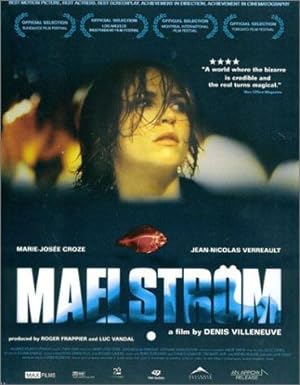Denis Villeneuve directed Maelstrom, which means whirlpool, a body of swirling water produced by the meeting of opposing currents. Maelstrom is a movie about a young woman in crisis who manages to survive and make a connection with an unlikely person. Maelstrom has subtitles for most of the dialogue, but only ardent artsy fartsy film lovers should take the plunge. Villeneuve is one of my favorite directors, and I can objectively understand why Maelstrom got accolades, but I still did not enjoy it.
Maelstrom tried too hard. The opening scene has the following, “Vi ber om unnskyldning til alle vare norske venner. Filmen viser et bilde av Norge some r basert pa kilsjeer. Vi skrev filmmanuset under hypnose. Vi beklager at alt I filmen er oppspinn.” Maelstrom does not interpret this for the audience. A friend was nice enough to interpret it for me. Apparently it is Norwegian and means, “We apologize to all our Norwegian friends. The film shows a picture of Norway based on clichés. We wrote the film manuscript under hypnosis. We regret that everything in the film is fiction.” Several characters are from Norway, but I did not know that yet. Villeneuve is from Quebec, and Maelstrom is shot there. I initially and mistakenly thought that I got the wrong movie or no subtitles would be provided.
Then a bloody, damaged fish repeatedly dies by the hands of a brutal butcher and is the narrator. Both are in an exaggerated, disgusting, almost medieval room. Occasionally there are brief cuts to the ocean as the foam churns in the wake of a ship. These scenes contrast sharply with the ultra sleek and clean world occupied by the main character, but this world is also filled with peril, just glossier. The fish tells her story, and occasionally Maelstrom uses silent film titles to explain what is happening.
Maelstrom uses fish, fishmonger, water and fire/dust imagery to suggest a never-ending cycle of life and death, destruction and renewal, baptism and rebirth, evolution. Fish and fishermen are also popular symbols in Christianity. The same stranger separately talks to the main character and the unlikely connection at different pivotal turning points. The stranger is an unlikely Christ like figure in disguise who does not minimize their problems, but constantly encourages them to live fully. “Woman, where are they? Has no one condemned you?” “No one, sir,” she said. “Then neither do I condemn you.” Jesus declared. “Go now and sin no more.” John 8:10-11
I think that I get Maelstrom, but I just don’t care. Villeneuve seemed to be imitating the styles of Terry Gilliam, Jean-Pierre Jeunet and Terence Gross’ Hotel Splendide instead of focusing on his own voice. Because I watch too many movies and saw Another Earth before Maelstrom even though it was released eleven years later, I even thought the plot twist was predictable, and it really isn’t. There are some really cool exploratory moments that are more joyful in tone, but still reminiscent of Alejandro Gonzalez Inarritu’s narrative structure to reveal the interconnectedness of seemingly unimportant events to the denouement. Villeneuve uses these moments to create suspense and tension before revealing the outcome of the main character’s desperate, impulsive decision. They are the most enjoyable parts of Maelstrom, but as a whole, the heavy-handed symbolism and highly stylized structure turned me off.
Maelstrom celebrates and embraces the contradictions and essential interconnections of life, but the mismatched styles and tones felt like a desperate gamble for success and minimized my emotional connection to the characters. Maelstrom’s characters felt more like contrived creations closer to puppets than people. Villeneuve is still one of my faves, but he is not perfect.
Stay In The Know
Join my mailing list to get updates about recent reviews, upcoming speaking engagements, and film news.





